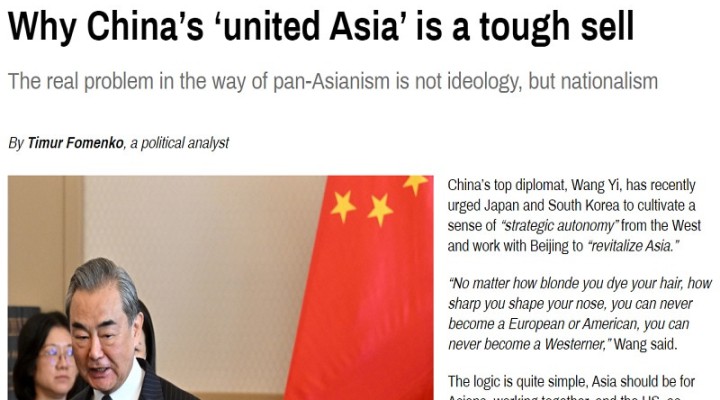RT’s Timur Fomenko Is Right: China’s Call For Asian Unity Will Likely Fall On Deaf Ears

Some Asia-Pacific countries’ “negative nationalism” vis-a-vis China is just as toxic as the variant expressed by many Central & Eastern Europeans vis-a-vis Russia.
Political analyst Timur Fomenko’s latest piece for RT explained “Why China’s ‘united Asia’ is a tough sell”, which drew attention to rising nationalist trends and regional countries’ twisted perceptions of the US as a guarantor against China’s supposedly hegemonic plans. These two factors will likely result in China’s call for Asian unity falling on deaf ears since those like Japan and South Korea who it’s directed towards the most think that it’s just a ruse for strategically disarming them.
Their “negative nationalism” vis-a-vis China is just as toxic as the variant expressed by many Central & Eastern Europeans vis-a-vis Russia. Instead of acknowledging their many socio-cultural similarities and building upon that to strengthen relations, they prefer to obsess over their differences and exploit them as the pretext for worsening relations. The US enthusiastically encourages this via its state policy and related “NGOs” that it supports since it fears the unification of regions that aren’t fully under its control.
European unity serves the US’ interests by providing it with a continental platform for containing Russia. There’s no credible chance of the EU turning against its transatlantic patron or at least playing hardball on significant issues since it already proved its fealty to Washington by imposing sanctions against Russia at the expense of its member states’ own economic interests. For these reasons, the US firmly supports European federalism, which it believes would make the containment of Russia more effective.
Likewise, the only “united Asia” that America would ever support is one that’s also under its aegis, which is actually in the process of formation via the regional NATO-like platform known as AUKUS+. This refers to informally expanding that alliance to include Japan, New Zealand, the Philippines, and South Korea, all of which are gradually coming together to contain China. This won’t take economic or political forms like European unity already has but will instead focus mostly on military cooperation.
Unlike the Western half of Eurasia, the Eastern one is experiencing a surge of nationalism exactly as Fomenko wrote, which is why it probably won’t ever emulate the European precedent in those ways. Nevertheless, these countries’ NATO-like military convergence is all that’s needed for the US to more effectively contain China. While some Asia-Pacific officials and media openly talk about this intent, most prefer to claim that they’re coming together due to their “shared values”.
This false pretext is exploited to gaslight that China’s claims of them militarizing the region are baseless and premised on its supposed fear of “democracies”. According to them, it’s actually China that’s allegedly responsible for destabilizing the Asia-Pacific, which isn’t true but is still repeated ad nauseam. This resembles the EU’s similarly false allegation that Russia is responsible for destabilizing Europe, which aims to absolve NATO of this just like the preceding narrative aims to absolve AUKUS+.
Returning to the lede, the insight shared in this analysis shows that parts of Asia are actually in the process of unifying, albeit not in the way that China wants. Far from behaving as strategically autonomous players in the New Cold War, a growing number of states are willingly becoming the US’ vassals for containing China. The Sino-Russo Entente therefore finds itself flanked on both sides, with only the South Eurasian Rimland being free from these plots, thus heightening India’s importance.
https://korybko.substack.com/p/rts-timur-fomenko-is-right-chinas
 TheAltWorld
TheAltWorld 
0 thoughts on “RT’s Timur Fomenko Is Right: China’s Call For Asian Unity Will Likely Fall On Deaf Ears”